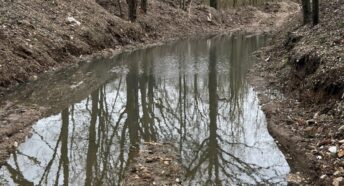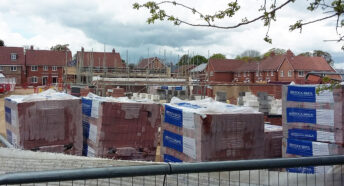'We have a Planning Bill that looks set to take us back to a deregulated dark age of development'

The Planning Bill highlighted in last week’s Queen’s Speech (Tuesday, May 11) has been blasted by CPRE, the countryside charity.
Tom Fyans, CPRE campaigns and policy director, said: “The Planning Bill looks set to prioritise developers’ needs over local communities, provide no new environmental safeguards and could slow the delivery of genuinely affordable homes in many areas. All in all, it risks creating a free-for-all for development.
“We know from painful experience that without the right checks and balances in the planning process, developments can lead to a huge and unnecessary loss of countryside while doing nothing to tackle the affordable housing crisis or level up.
“That’s why we urgently need more joined-up thinking from the government if we are to address the nature and climate emergencies. On the one hand, we’ve got the Environment Bill being touted as world-beating legislation to leave nature in a better state than we found it over the next 25 years. On the other hand, we have a Planning Bill that looks set to take us back to a deregulated dark age of development.
“The government must urgently rethink the Planning Bill. If not, we’re facing an open season for developers on large parts of the countryside, and a fatal weakening of local communities’ right to be heard on the future of their area.”
Monday, May 17, 2021
- A number of important documents have yet to emerge. For example, a rigorous transport plan and a finalised air-quality assessment. The latter is critical given that allocations at Teynham will feed extra traffic into AQMAs.
- There seems to be no coherent plan for infrastructure delivery – a key component of the plan given the allocations being proposed near the already crowded Junction 7.
- There seems to have been little or no cooperation with neighbouring boroughs or even parish councils within Swale itself.
The removal of a second consultation might have been understandable if this final version of the plan were similar to that being talked about at the beginning of the consultation process. It is, however, radically different in the following ways:
- There has been a major shift in the balance of housing allocations, away from the west of the borough over to the east, especially around the historic town of Faversham. This is a move that raises many concerns.
- A new large allocation, with accompanying A2 bypass, has appeared around Teynham and Lynsted, to which we are objecting.
- Housing allocations in the AONB around Neames Forstal that were judged “unsuitable” by the council’s own officers have now appeared as part of the housing numbers.
- Most of the housing allocations being proposed are on greenfield sites, many of them on Grade 1 agricultural land – a point to which we are strongly objecting.
Concerns about the rush to submit the plan
The haste with which the plan is being prepared is especially worrying given the concentration of housing in Faversham. If the town is to take a large amount of new housing, it is imperative that the policies concerning the area are carefully worked out to preserve, as far as possible, the unique nature of the town. The rush to submit the plan is likely to prove detrimental.
As Swale does not have a five-year land housing supply, it is open to speculative development proposals, many of which would run counter to the ideas contained in the current plan. Some are already appearing. This is a common situation, and one that, doubtless, is a reason behind Swale’s haste.
Our overriding fear, however, is that this emphasis on haste is ultimately going to prove counterproductive. This is because it is our view that the plan, in its current form, is unlikely to pass independent examination. We are urging Swale to listen to and act upon the comments being made about the plan and to return the plan to the council with appropriate modifications before submitting it to the Secretary of State.
Essentially, this means treating the current consultation not as the final one but as the ‘lost’ second consultation.
The consultation ends on Friday 30 April and we strongly urge residents to make their opinions known if they have not already done so.
Further information








